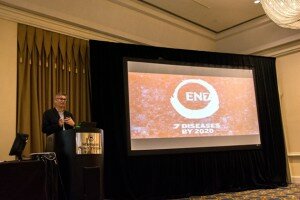This blog post was originally published on the Sabin Vaccine Institute website.
Earlier this month the United Kingdom’s Houses of Parliament met on two separate occasions to discuss global health priorities with debates on global health research and development and health systems strengthening. These debates occurred at a crucial time in the Parliament’s calendar as the UK draws closer to the end of this parliamentary session (2010 – 2015) and moves forward towards the General Election in May 2015. It is one of the last few opportunities for parliamentarians to raise awareness of key global health issues before a new Government and parliament is voted in during the spring of 2015.
Baroness Helene Hayman, Board Trustee at the Sabin Vaccine Institute and Vice-chair of the UK’s All- Party Parliamentary Group on Malaria and Neglected Tropical Diseases (NTDs); and Jeremy Lefroy, Member of Parliament (MP) and Board Trustee for Sabin Foundation Europe, raised important points on the role of NTD control and elimination in alleviating poverty and needless suffering in these parliamentary discussions, highlighting successes to date and the challenges that lie ahead.
On Monday December 8th, following the release of the All-Party Parliamentary Group on Global Tuberculosis report on Global Health Research and Development, the UK parliament’s House of Lords hosted a debate on research and development for tuberculosis, and the UK’s broader global health research agenda.
Baroness Hayman began by congratulating the All-Party Parliamentary Group on Global TB on their recent report titled, Dying for a Cure: Research and Development in Global Health. She applauded the report’s recognition of the 1.4 billion people who suffer from NTDs and called for increased research for new tools to combat these diseases, highlighting the significant impact of vaccines in combating these diseases.
“[The report] has recognized that NTDs are diseases not only born of poverty but which create poverty,” she said. “They undermine education, employment, health—all the opportunities that would allow people to claw their way out of poverty. Therefore, combating the diseases of the poor, including the big three (HIV/AIDS, tuberculosis and malaria), is an essential element of the fight against poverty and for social and economic development.”
“For some of those diseases, we already have treatments for which we need more resources — for example, for mass drug administration for soil-borne helminth diseases,” argued Baroness Hayman. “But we still desperately need to develop better medicines, smarter diagnostics and, above all, vaccines if we are to make progress.”
Given the success of investments (including from the UK Government) in to product development partnerships (PDPs) such as Drugs for Neglected Diseases initiative and PATH, in producing a number of new tools to combat diseases as well as filling a robust pipeline of candidates for clinical trials in recent years, Baroness Hayman called on the Department for International Development (DFID) to not only increase its budget to further support global health research and development (R&D) but also that continued support and greater investment be directed to PDPs. PDPs, an innovative model of research that combines private, public and philanthropic partnerships to help develop and progress research candidates in the most efficient way possible, have proven themselves to be an excellent R&D model that is channeling results from investments.
Baroness Hayman also recognized that new tools for NTDs will play a vital role alongside the scale up of delivery of existing NTD treatments to help us achieve global goals in control and elimination of these diseases.
Baroness Hayman ended her comments with two final pleas to the UK Government. The first, to increase their commitment, and the resources they devote, to the “vital work of PDPs.” The second, “to not neglect the importance of the research that can take place in the countries and the communities where diseases are themselves endemic,” commenting on the importance of investing in capacity strengthening of scientists in countries with a high burden of these diseases.
On December 11th, two days after the House of Lords debate, the House of Commons convened for an additional debate following the final reports of the International Development Select Committee (IDC) inquiries on Health Systems Strengthening and Disability. Jeremy Lefroy MP, urged Parliament and the UK Government to continue to prioritize NTD efforts in the areas of health systems strengthening and disability.
In his comments, Jeremy Lefroy references the importance of integrated disease programs in Tanzania which have helped maximize the efficiency of health systems.
“This programme tackles neglected tropical diseases,” he explained. “Instead of looking at only one—lymphatic filariasis, for instance, or worms—it is tackling four of those debilitating diseases alongside each other.
In other parts of the world we find the use of pooled funds—for example, pooled health funds in South Sudan and Mozambique, the development partners for health in Kenya and the health transition fund in Zimbabwe. All are excellent examples of people coming together to strengthen health systems locally, showing that it is not simply about one person making their one vertical intervention, but everyone working to bring the money together and make the best use of it.”
Jeremy Lefroy also emphasized the importance of prevention for controlling and eliminating NTDs and malaria.
“[NTDs] affect the poorest people on this planet—something like 1.4 billion people in the course of a year.” He said. “In fact, NTDs not only affect the poorest people and cause morbidity and sometimes mortality, but they often cause disability. And they are eminently curable, or at least eminently preventable, often by very cheap interventions.
That is why I was thrilled that the last Government decided to make NTDs a priority, and this Government, through the London declaration on NTDs in January 2012, has continued that work, providing, I think, £240 million in total, including the money committed by the last Government, over a four-year period. I ask the Minister to ensure that that commitment to the prevention and treatment of NTDs is continued, because it has a huge impact on disability and the prevention of disability.”
As we draw closer to the end of the current set of Millennium Development Goal and global discussions on what happens next through the Post 2015 development agenda, these parliamentary discussions on global health issues in many countries, including those like the UK who are key champions for NTDs, will play a critical role in building the essential political will to increase efforts to reach global NTD goals. We hope that these discussions will also continue in other countries to stimulate further global discussion on recognizing the milestone achievements we have reached so far as well as what more must be done to end these diseases for once and for all.
To read the full transcript of the House of Lords debate, click here. To read the full transcript of the House of Commons debate, click here.







